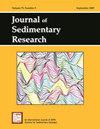非钙质页岩中的褶皱方解石裂缝:研究页岩成岩作用和热液影响的窗口
IF 2.1
4区 地球科学
Q1 GEOLOGY
引用次数: 0
摘要
页岩的成岩作用尚不清楚,页岩中的裂缝包含了成岩条件的重要信息。这些裂缝打开的方式揭示了沉积物的物理变化,而填充的矿物质提供了对地层水化学条件的了解。通常,充填褶皱裂缝的自生矿物与寄主岩石的化学成分一致。例如,在石灰岩中可以发现褶皱的方解石裂缝。本文主要研究非钙质黑色页岩中的一组褶皱方解石裂缝。目的是通过破译这些裂缝的起源来提高我们对页岩成岩作用的理解。裂缝在纵向上呈螺旋状至柱状褶皱,在顺层面上呈弱弯曲。它们充满方解石、沥青、黄铁矿或它们的组合。生物扰动的证据和低氧化还原敏感的微量元素比率表明页岩的缺氧沉积条件。裂缝可能是由于未固结泥浆中的气体膨胀而打开的。充填裂缝的主要矿物方解石来自穿过下伏白云岩的热液。裂隙中存在斑铁矿和微晶黄铁矿,并在寄主沉积物中富集Fe和Mn,表明热液的影响。热液活动也可以解释buddingtonite的存在,buddingtonite是页岩中的一种铵长石。研究结果表明,早期成岩作用可能形成由矿物充填的褶皱裂缝,向顶部逐渐缩小,内部缺乏碎屑基质。充填物的化学成分与寄主沉积物的化学成分不一致,需要进一步勘探以确定其来源。通过下伏白云岩的热液可能是非钙质沉积岩中方解石褶皱裂缝的来源。这些裂缝类似于臼齿结构(MTS),是一种充满微晶方解石的弯曲裂缝,多见于前寒武纪灰岩和钙质页岩中。如果这些裂缝确实是MTS,它们可能是MTS年龄和寄主岩石岩性限制的一个例外。本文章由计算机程序翻译,如有差异,请以英文原文为准。
Folded calcite cracks in non-calcareous shales: a window into shale diagenesis and hydrothermal influence
Shale diagenesis is not well understood, and the cracks in shale contain important information about the diagenetic conditions. The way these cracks open reveals physical changes in the sediment, and the infilling minerals provide insight into the chemical conditions of the formation water. Typically, the authigenic minerals filling the folded cracks are consistent with the chemical composition of the host rocks. For example, folded calcite cracks are found in limestone. This paper, however, focuses on a set of folded calcite cracks in non-calcareous black shales. The goal is to improve our understanding of shale diagenesis by deciphering the origins of these cracks. The cracks are sinuously to ptygmatically folded in a vertical view and weakly sinuous on the bedding plane. They are filled with calcite, bitumen, pyrite, or a combination of them. Evidence of bioturbation and low redox-sensitive trace elemental ratios suggest suboxic to oxic depositional conditions of the shale. The cracks were likely op ened by gas expansion in the unconsolidated mud. The main mineral filling the cracks, calcite, was sourced from hydrothermal fluid that passed through the underlying dolomite. Hydrothermal influences are indicated by the presence of bornite and microcrystalline pyrite in the cracks, as well as Fe and Mn enrichment in the host sediments. Hydrothermal activity can also explain the presence of buddingtonite, an ammonium feldspar in the shale. The results of this study suggest that folded cracks filled by minerals, gradually narrowing towards the top, and lacking internal detrital matrix are likely formed during early diagenesis. The inconsistency between the chemical compositions of the infilling material and the host sediment requires further exploration to identify the source. Hydrothermal fluid passing through the underlying dolomite may be the source of folded calcite cracks in non-calcareous sedimentary rocks. These cracks resemble molar-tooth structures (MTS), which are sinuous cracks filled with micro crystalline calcite mostly found in Precambrian limestone and calcareous shales. If these cracks are indeed MTS, they may be an exception to the age and host-rock lithology constraints of MTS.
求助全文
通过发布文献求助,成功后即可免费获取论文全文。
去求助
来源期刊
CiteScore
3.80
自引率
5.00%
发文量
50
审稿时长
3 months
期刊介绍:
The journal is broad and international in scope and welcomes contributions that further the fundamental understanding of sedimentary processes, the origin of sedimentary deposits, the workings of sedimentary systems, and the records of earth history contained within sedimentary rocks.

 求助内容:
求助内容: 应助结果提醒方式:
应助结果提醒方式:


